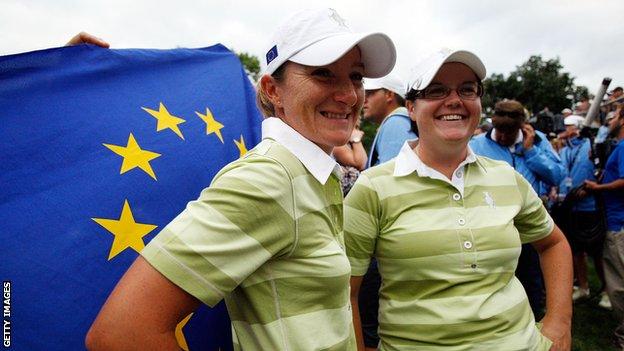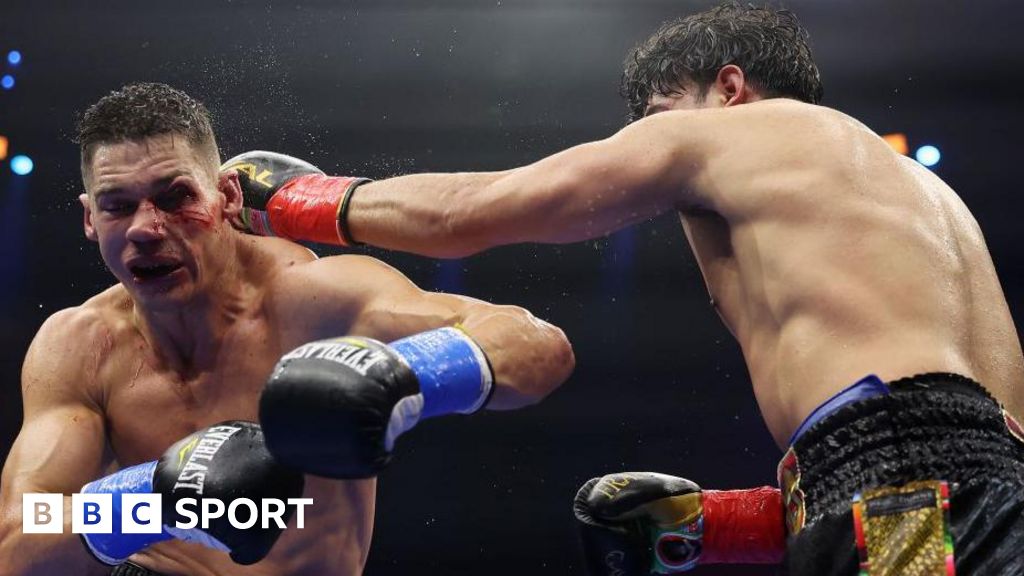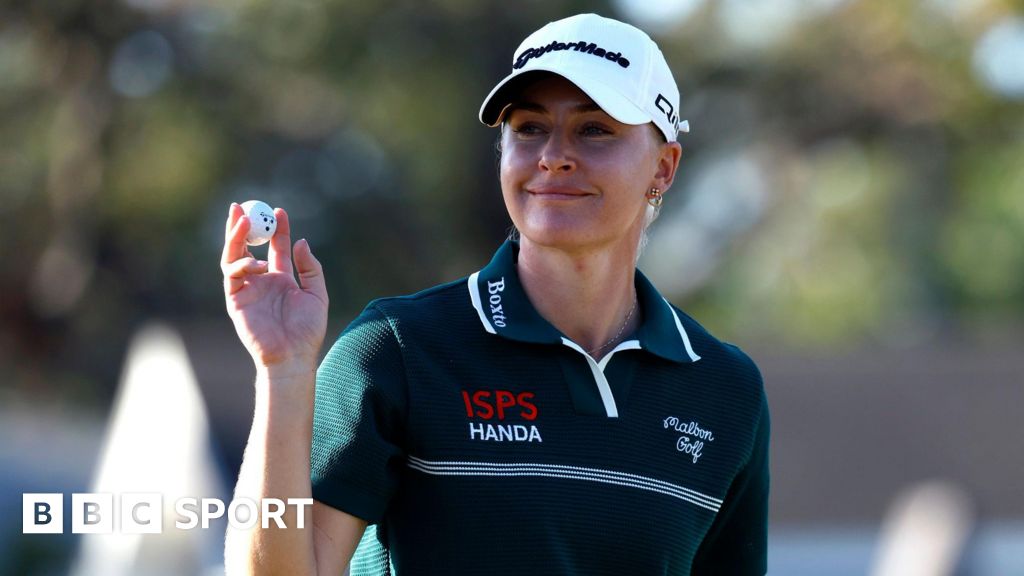ARTICLE AD BOX
 Becky Brewerton's career has included two Ladies European Tour wins and two Solheim Cup appearances
Becky Brewerton's career has included two Ladies European Tour wins and two Solheim Cup appearances"How did I become so bad at golf?"
It is not an uncommon phrase in clubhouses up and down the country most weekends, as hobbyists hack their way around their local course during their spare time.
But for Welsh golfer Becky Brewerton, it was a question that dominated her thinking, even when there appeared to be no reason to ask it.
On the face of it, hers is a career that suggests the game of golf and a personal fulfilment came with a natural ease - spanning 19 years and including two Ladies European Tour wins, two Solheim Cup appearances and a string of impressive finishes.
Yet the reality has been a decade-long struggle with the mental strains of being an elite sportsperson.
As the 39-year-old from St Asaph put it in an emotional interview on Radio Wales Sport: "As a sportsperson, you're kind of defined by your job so if it's not going well, if I'm not playing well, then 'Who am I? What's the point?'"
It is in keeping with an honesty both brutal and brave displayed in a recent blogpost on the matter, where the questions keep coming.
They led to taking time off from the game - delivering takeaway food among other things - and admitting she almost craved others to acquiesce to her desire to walk away completely.
She had, in her words, "completely and utterly given up on herself as a professional golfer", drained from the toil of self-doubt that emerged in the earliest days of her time on the European Tour and left her terrified off the first tee.
'My arms, literally, I couldn't feel them'
Explaining the build-up to an event, she described how tension would begin to creep in two days before the opening round and that "the whole time you're just trying to convince yourself, 'No, I'll be OK, this could be the week'."
Already fighting against poor sleep and panic attacks, then came the Thursday.
"I'd get to 20 minutes before my tee time, or sometimes it would even be as I was walking towards the tee, and it was as if someone had injected you with something," she says.
"It would be like a big rush, just this feeling would go up my body. My heart would feel like it was going to pump out of my chest and I knew then the first tee shot was going to be pretty difficult.
"It would come out in the golf swing, especially on the tee.
"My legs would almost feel like jelly, without me feeling like I was going to fall over or anything like that.
"And my arms, literally, I couldn't feel them. You need to have that feeling in a swing of where your arms are, when you're at the top of the swing, but I had no concept. They could have been anywhere and it makes the timing pretty much impossible."
Perhaps there is a temptation to suggest golfers having that feeling of mind and body being disconnected is no rare thing. After all, the 'yips' have affected some of the greats, such as Bernhard Langer and Tom Watson in the men's game.
Brewerton's story, though, is more about a long period of self-doubt that careered from professional to personal than a struggle with the short game.
It first emerged early on in her career where she turned pro in 2003. She describes how, even during one of her best memories in golf, as she played alongside Laura Davies during her first Solheim Cup in 2007, it was present.
Brewerton was taken aside by one of the vice-captains, who had noticed her insecurity having made the leap from the successful small pond of amateur golf to the deep waters of the elite of the women's game.
 Becky Brewerton (right) has represented Europe at the 2007 and 2009 Solheim Cups
Becky Brewerton (right) has represented Europe at the 2007 and 2009 Solheim CupsShe says the nature of the tour - event after event - meant she had little time to dwell, simply putting those nagging questions down to something everyone went through.
But then came an accident while out on a bike, a moment Brewerton pinpoints as when the anxiety began to overwhelm her.
Rushing back from painful injuries in time for the start of the season in Australia, she missed three cuts. Her lowest periods were beginning.
"I guess I thought, 'Crikey, if now my body as well as my mind isn't working as it should, what's going to happen?'," she says.
And yet the questions Brewerton wanted to be asked often did not come.
"Where I used to live, whenever I got home, my neighbours would always ask, 'How's the golf?' or make a comment about something they'd seen on the TV," she says.
"But no one was ever like, 'How are you?' It feeds the narrative you are just about your golf and, obviously, if it's not going well then you sort of think, 'Well, who am I?' You kind of don't have a place in the world."
'People in my life refused to give up on me'
It still took another four years before Brewerton approached someone for help, asking another question, only this time to someone else: "Is this normal?"
Finding courage and the crutch of support from others, it still took time.
"The important people in my life, they were the ones who would say 'don't give up, keep going, keep working'," she explains.
"And I was the one who almost didn't understand why. I was saying 'Why would I carry on?'.
"I almost wanted somebody at times to say 'no, just pack it all in'. But they sort of refused to give up on me and now I'm at this point, I'm glad that they did."
Just as Brewerton is glad she committed her experience to words in her blog, detailing a journey she once thought was impossibly full of "misery and self-doubt".
She had tried previously, but was left with blank pieces of paper, before two tour events in Saudi Arabia this November - that she called the "final piece of me feeling OK" - prompted her to text a friend saying she was attempting to write, but scared no words would come.
"Then an hour later I had 25 pages… it was an amazing how it all just sort of flowed," she says.
It helped unlock the freedom and enjoyment Brewerton wondered if she would ever get back.
"When that - I guess anxiety I would call it - was so high, I honestly thought I'd never be able to hit another shot on a golf course ever again without feeling like that," she says.
"So the goal originally was just to be able to play without that feeling, even if it wasn't professionally. The two events I had in Saudi I enjoyed so much because it produced that sense of freedom, I guess.
"My body was free of the restraints, my mind was free of the restraints so it was quite refreshing and I really took it in and I do actually think I'm playing how I want to play.
"It's not taught, it's not coached, it's not manufactured. It's just me playing like you do when you're a kid, pretty much.
"Just no fear of consequences, no 'I've got to do this otherwise this person's going to be upset about it' - none of that.
"It was just me playing with no thought really of anything else. It's quite nice to be engrossed in it in that way."
Brewerton hopes her openness will help others, even away from the "shoulders back" bravado of golf.
She does ponder whether there should be greater support - such as a welfare officer - for those locked in their own thoughts in the isolation of the individual sport, especially for those without the entourage of coaches only available to those at the very highest level of earnings.
"You'll go up and down and see lots of dramas and club-throwing and people taking themselves off and having a little cry, or whatever it might be," Brewerton recalls.
But in terms of her own self, Brewerton appreciates every little moment so much more, adding that success in one of the Rose Ladies Series events in May was special to "mark" her rebirth as a golfer -although she feels she has claimed a more valuable prize.
"I could win 10 majors and become world number one and I still think my best achievement would be managing to sort of get my enjoyment out of it again," she says.
She is comfortable that a career that has spanned almost 20 years is now one of contentment rather than struggle. No question about it.
"I'm putting a lot of work into it and I'd say what would make it easier is the fact that I am comfortable," adds Brewerton, who has added coaching to her impressive resume.
"This could be my last stint, or even if the standard of my golf might not be what I want it to be, because I've done all this other stuff. Even if it ended tomorrow, then I think I'd be OK with it.
"When you've been a professional golfer your whole life you think 'I'm not qualified to do anything else'.
"And then I guess just by the discipline that you've had to live by and work ethos you've had to have, it was actually a lot easier than I thought it would be to find a job or get some way to do other stuff - and you always treat it in the same way.
"So I think I'm comfortable now knowing it wouldn't matter if it was the end; I hope it's not, but it wouldn't matter because I'm comfortable knowing I could go and do something else.
"And the fact I have had those rounds that I've enjoyed sort of means that was the barrier I wanted to get over."
*Listen to the full interview with Becky Brewerton on Friday night Radio Wales Sport with Chris Wathan and Bethan Clement, available on demand.

- 'Hold tight and pretend it's a plan!': You can watch all the Doctor's latest adventures on BBC iPlayer
- What would it be like to have Superman as a dad? Watch now as Clark Kent and Lois face their greatest test


 2 years ago
54
2 years ago
54








 English (US)
English (US)